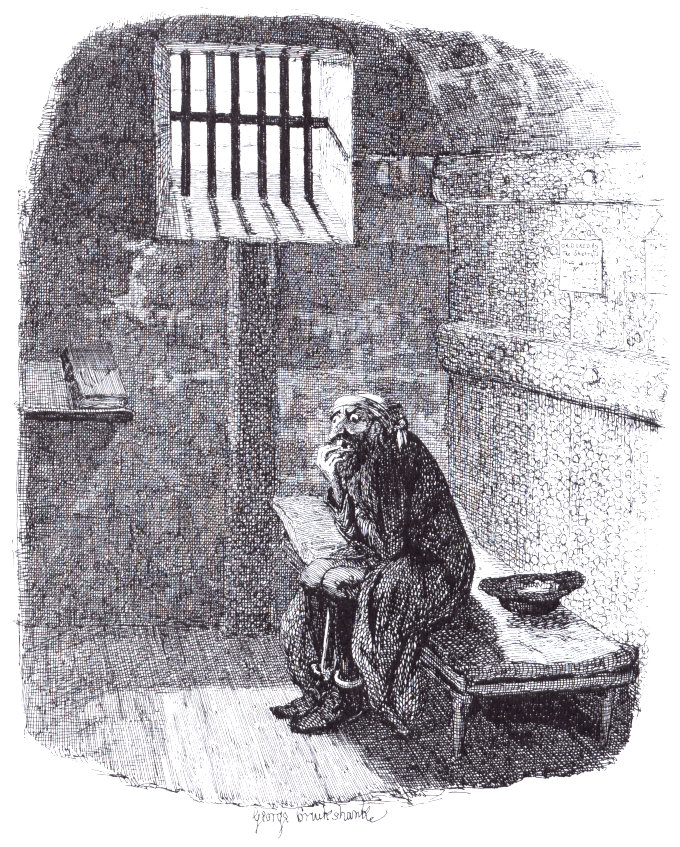Fagin is the secondary antagonist in Charles Dickens’s 1838 novel Oliver Twist. Originally depicted by Dickens as explicitly Jewish, in the preface to the novel, he is alleged to be a “crafty old Jew” and a fence. In the story, Fagin is the leader of a group of children (the Artful Dodger and Charley Bates among them) whom he teaches to make their livings by pickpocketing and other criminal activities, in exchange for shelter. A distinguishing trait is his constant and insincere use of the phrase “my dear” when addressing others. At the time of the novel, he is said by another character, Monks, to have already made criminals out of “scores” of children. Nancy, who is the lover of Bill Sikes (the novel’s lead villain), is confirmed to be Fagin’s former pupil. Fagin is a confessed miser who, despite the wealth that he has acquired, does very little to improve the squalid lives of the children he guards, or his own. In the second chapter of his appearance, it is shown (when talking to himself) that he cares less for their welfare, than that they do not “peach” (inform) on him and the other children. Still darker sides to the character’s nature are shown when he beats the Artful Dodger for not bringing Oliver back; in his attempted beating of Oliver for trying to escape; and in his own involvement with various plots and schemes throughout the story. He indirectly but intentionally causes the death of Nancy by falsely informing Sikes that she had betrayed him, when in reality she had shielded Sikes from the law, whereupon Sikes kills her. Near the end of the book, Fagin is captured and sentenced to be hanged, in a chapter which portrays him as pitiable in his anguish. Though portrayed as cunning and manipulative, Fagin’s characterization has been the subject of longstanding criticism for its antisemitic overtones… Fagin has since become a prominent example in literary and cultural studies of the antisemitic stereotype of the “Jewish villain” and as “one of the most infamous antisemitic caricatures of all time.” In response to this legacy, creators such as Will Eisner have reinterpreted the character from more sympathetic or critical perspectives, as in Eisner’s 2003 graphic novel Fagin the Jew…
| Alias Fagin |
| Real Names/Alt Names Fagin |
| Characteristics Criminal Mastermind, Literary Characters, Wold Newton Universe, Realism and Victorian Age, Public Domain |
| Creators/Key Contributors Charles Dickens |
| First Appearance “Oliver Twist; or, The Parish Boy’s Progress” in Bentley’s Miscellany (February 1837 to April 1839) |
| First Publisher Bentley’s Miscellany (serialization), Richard Bentley (novel) |
| Appearance List Novel: Oliver Twist (1838). Film: Oliver Twist (1909, 1912, 1912 (2), 1916, 1919, 1922). Theater: Oliver Twist; or, The Parish Boy’s Progress (1838). Comics: Star Comics #1, Kid Eternity #9. |
| Sample Read Oliver Twist (1838) [Standard eBooks] |
| Description Fagin is the secondary antagonist in Charles Dickens’s 1838 novel Oliver Twist. Originally depicted by Dickens as explicitly Jewish, in the preface to the novel, he is alleged to be a “crafty old Jew” and a fence. In the story, Fagin is the leader of a group of children (the Artful Dodger and Charley Bates among them) whom he teaches to make their livings by pickpocketing and other criminal activities, in exchange for shelter. A distinguishing trait is his constant and insincere use of the phrase “my dear” when addressing others. At the time of the novel, he is said by another character, Monks, to have already made criminals out of “scores” of children. Nancy, who is the lover of Bill Sikes (the novel’s lead villain), is confirmed to be Fagin’s former pupil. Fagin is a confessed miser who, despite the wealth that he has acquired, does very little to improve the squalid lives of the children he guards, or his own. In the second chapter of his appearance, it is shown (when talking to himself) that he cares less for their welfare, than that they do not “peach” (inform) on him and the other children. Still darker sides to the character’s nature are shown when he beats the Artful Dodger for not bringing Oliver back; in his attempted beating of Oliver for trying to escape; and in his own involvement with various plots and schemes throughout the story. He indirectly but intentionally causes the death of Nancy by falsely informing Sikes that she had betrayed him, when in reality she had shielded Sikes from the law, whereupon Sikes kills her. Near the end of the book, Fagin is captured and sentenced to be hanged, in a chapter which portrays him as pitiable in his anguish. Though portrayed as cunning and manipulative, Fagin’s characterization has been the subject of longstanding criticism for its antisemitic overtones… Fagin has since become a prominent example in literary and cultural studies of the antisemitic stereotype of the “Jewish villain” and as “one of the most infamous antisemitic caricatures of all time.” In response to this legacy, creators such as Will Eisner have reinterpreted the character from more sympathetic or critical perspectives, as in Eisner’s 2003 graphic novel Fagin the Jew… |
| Source Fagin – Wikipedia |

